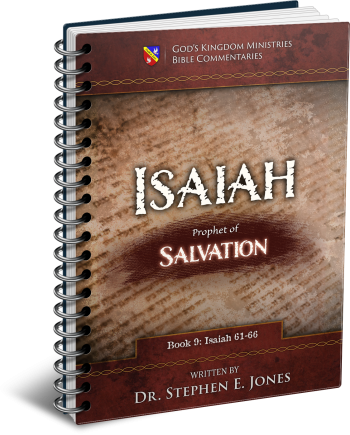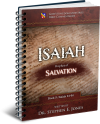Latest Posts
View the latest posts in an easy-to-read list format, with filtering options.

Isaiah is the prophet of Salvation. He is also known as the truly "Universalist" prophet, by which is meant that He makes it clear that salvation is extended equally to all nations and not just to Israel. He lived to see the fall of Israel and the deportation of the Israelites to Assyria, and he prophesied of their "return" to God (through repentance). He is truly a "major prophet" whose prophecies greatly influenced the Apostle Paul in the New Testament.
Category - Bible Commentaries

In view of the inevitable disaster that was coming, Isaiah 65:8 says,
8 Thus says the Lord, “As the new wine is found in the cluster, and one says, ‘Do not destroy it, for there is benefit in it,’ so I will act on behalf of My servants in order not to destroy all of them.”
Since Israel had already been exiled to Assyria, the prophet was applying the prophecy also to the nation of Judah, which he knew was destined to be deported to Babylon (Isaiah 39:6). The word of God compared righteous Judahites to a “cluster” of grapes in a field that was being destroyed. This pictured the salvation of a “remnant,” of which the prophet had received revelation many years earlier.
Recall that one of Isaiah’s sons was named Shear-jashub, “The Remnant Will Return” (Isaiah 7:3). His other son was named Maher-shalal-hash-baz, “Swift is the booty, speedy is the prey” (Isaiah 8:3), signifying the destruction of Israel. The two were named as prophetic signs (Isaiah 8:18) of the destruction of the nation and the salvation of the remnant.
Therefore, the prophecy in Isaiah 65:8, 9 supplemented the prophecy in the names of his sons. It shows that the promise of God to Israel was to be fulfilled in a mere remnant, a “cluster” that was salvaged from the destruction of the field. The Apostle Paul understood this when he wrote in Rom. 11:1, 2,
1 I say then, God has not rejected His people, has He? May it never be!... 2 God has not rejected His people whom He foreknew…
Paul then spoke of the remnant in the days of Elijah, the 7,000 men who had not bowed the knee to Baal, telling us in Rom. 11:5,
5 In the same way, then, there has also come to be at the present time a remnant according to God’s gracious choice.
The remnant, he says, are His people, the chosen ones. Just because the rest of the nation was descended from Abraham, Isaac, Jacob, and Judah (or Benjamin) did not mean that they were God’s chosen people. Paul himself was not chosen on account of his descent from Benjamin. He was chosen because God had chosen to reveal Himself to him on the Damascus road. That revelation produced New Covenant faith.
Those who rejected Jesus as the Messiah did not obtain what they were seeking, and so “the rest were hardened” (Rom. 11:7). Paul distinguishes between those who were “chosen” and those who were “hardened.” No doubt the apostle received this teaching from Isaiah.
Those who make a blanket statement claiming that God’s chosen people are the Jews (of Judah) or the Israelites of the Assyrian captivity are contradicting both Isaiah and Paul. No one is chosen by race or genealogy, for then there would be no remnant for God to choose by His grace.
The destruction of the nation, then, was not to be total, for God was to spare and protect this remnant through whom the promises of God were to be fulfilled. This does not mean that the rest would be lost forever, as so many think. It simply means that those who are lost will be found at a later time, mostly at the great White Throne judgment when every knee bows to Christ and every tongue then swears allegiance to Him.
The plan of God was to use the few to bless the many (Gen. 12:3). In Isaiah’s case, the remnant was to carry the promise of God to the rest of the world, both in their lifetime and in the age to come.
Isaiah 65:9 says,
9 “I will bring forth offspring from Jacob, and an heir of My mountains from Judah; even My chosen ones shall inherit it, and My servants will dwell there.”
The “offspring from Jacob” are distinct from the “heir of My Mountains.” The wording shows that the offspring as a whole are not from Israel but “from Jacob.” Jacob was a believer all of his life, but he was not an overcomer until his encounter with Peniel, when his name was changed to Israel. Jacob was fleshly and allegorically represented the old man of flesh, the religious man whose faith was yet imperfect.
Jacob thought God needed his help to fulfill the promise of God. That was why he lied to his father to obtain the blessing (Gen. 27:19). He knew the prophecy that God had spoken before he and his brother were born, saying, “the older shall serve the younger” (Gen. 25:23). But when Isaac intended to bless his older son, Esau, Jacob (instigated by his mother) did not believe that God was able to fulfill His promise without some help from the flesh. Hence, he deceived his father to help God fulfill His promise.
One cannot become an inheritor by unlawful means. Paul says in 2 Timothy 2:5,
5 Also if anyone competes as an athlete, he does not win the prize unless he competes according to the rules [nomimos, “lawfully”].
On a fleshly level, Jacob did indeed obtain the birthright by deception, but it was only when he wrestled with the angel that he truly obtained the blessing from God. In the interim, he had to go into captivity to Syria (where Laban lived). Captivity is not characteristic of heirs—except during their time of discipline as God prepares them to receive the inheritance.
Paul says that heirs who are yet immature in faith are no different from slaves (Gal. 4:1). Though Jacob was a grown man working for Laban, his faith was immature during the entire time of his slave labor. This is seen in the manner in which he outwitted Laban to enrich himself. He had beaten Esau, then Laban, but finally he found himself defeated by the angel Peniel.
The angel “touched the socket of his thigh, so the socket of Jacob’s thigh was dislocated while he wrestled with him” (Gen. 32:25). Jacob was incapacitated and could no longer wrestle. He could only hang on to the angel’s leg. Jacob had reached the end of his strength, and thus, he won by losing all confidence in the flesh. This was how he “prevailed” (Gen. 32:28). He did not defeat the angel; the angel defeated his flesh man. He ceased to have confidence in the flesh and turned instead to have faith in God. Thus, he turned from Old Covenant faith in himself to New Covenant faith in the promises of God.
The “heir of My mountains” in Isaiah 65:9 is the collective body of the remnant, whose Head is Christ. David’s throne was set up on Mount Zion, and this mountain came to represent the government of the Kingdom. This is the remnant of grace, the overcomers who are the chosen heirs. The rest—that is, the Jacobites, the immature believers—are the citizens of the Kingdom.
In the broader sense, however, we must keep in mind that Zion was the seat of David’s government, relative to the earthly Jerusalem, which Paul calls “Hagar” (Gal. 4:24). Sion is the seat of Christ’s government, relative to the heavenly Jerusalem, which is “Sarah.” Mount Sion is the place where Jesus was transfigured in Matthew 17, and it is the Mount around which we rally to support Christ’s Kingdom (Heb. 12:22, KJV).
Isaiah 65:10 says,
10 “Sharon will be a pasture land for flocks, and the valley of Achor a resting place for herds, for My people who seek Me.”
The “flocks” and “herds” are metaphors for “My people who seek Me.” The prophet was comparing the people to sheep, even as David wrote in Psalm 100:3, “We are His people and the sheep of His pasture.” Sharon was known for its fertility and beauty. The promise given to God’s people is that they will be well fed with the word.
Achor was the place where Achan was stoned for his sin which had caused Israel to lose the battle against Ai (Joshua 7:24-26). The Israelites had suffered 36 casualties in that first battle, and Achan was held responsible for their deaths, as well as for stealing from God’s treasury. We do not know the valley’s prior name, but Joshua 7:26 says, “the name of that place has been called the valley of Achor to this day.” Achor means “trouble, disturbance, causing sorrow.”
The prophecy in Isaiah says that this this will be reversed. Another prophet mentions this as well, for Hosea 2:14, 15 speaks of the restoration of Gomer (Israel), saying,
14 Therefore, behold, I will allure her, and bring her into the wilderness, and speak kindly to her. 15 Then I will give her vineyards from there, and the valley of Achor as a door of hope. And she will sing there as in the days of her youth, as in the day when she came up from the land of Egypt.
Hosea uses the valley of Achor to give hope to Israel, while Isaiah uses the same example to give Israel rest. Hosea makes it clear that this hope will be given in “the wilderness,” that is, NOT in the old land of Israel. Achor (“trouble”) will be turned into a place of rest when the sin of Achan is resolved fully.
Achan’s sin in stealing the gold and silver from God’s treasury prophesied of a deeper problem in the future, which affects us to this day. Jericho was “devoted” to God, and Joshua 6:19 says,
19 But all the silver and gold and articles of bronze and iron are holy to the Lord; they shall go into the treasury of the Lord.
Achan disagreed, acting “unfaithfully” (Joshua 7:1) by taking gold and silver and burying it under his tent (Joshua 7:21). The prophetic significance of this was not clear until many years later, when Daniel interpreted Nebuchadnezzar’s dream about the great image made of gold, silver, bronze, and iron (Dan. 2:32, 33). We see from this that these four metals represent empires ruled by men.
These empires, like Jericho, were to be destroyed, but the people themselves were to be saved, i.e., put into God’s treasury. It is a prophecy of the restoration of all things, when all nations serve Christ. So Psalm 67:1, 2 says,
1 God be gracious to us and bless us and cause His face to shine upon us—Selah. 2 That Your way may be known on the earth, Your salvation among all nations.
The problem is that many Christians today disagree with the divine plan to save the world. Spiritually speaking, they commit the sin of Achan by preferring to bury the silver and gold in the ground, rather than put it in God’s treasury. That is the “trouble” and “disturbance” inherent in the prophetic name, Achor.
But the prophets assure us that God will ultimately turn Achor into “a door of hope” and “a resting place” for those who truly seek God. It speaks of the day when Jacobite believers will discover the sovereignty of God and become Israelites, having the faith of Abraham to believe that God will indeed fulfill His New Covenant vow.